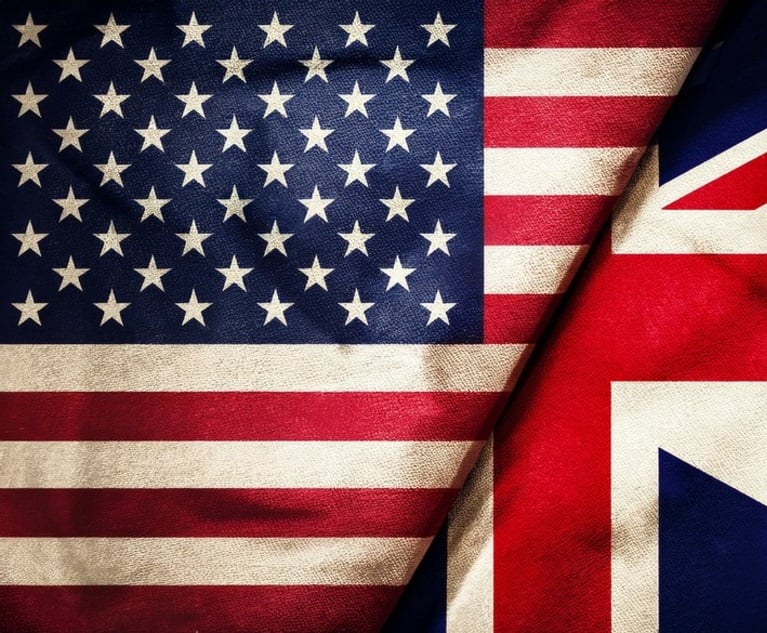Eversheds Sutherland follows transatlantic tie-up with Singapore merger deal
Newly merged firm gains Singapore law capabilities with Harry Elias combination
February 15, 2017 at 05:09 PM
5 minute read
Eversheds Sutherland is to merge with Singapore's Harry Elias Partnership after receiving approval from the Singapore Ministry of Law.
The long-awaited deal creates a combined firm – Eversheds Harry Elias – with more than 90 lawyers in Singapore and Brunei. Eversheds, which will own 33% of the combined firm's equity, will have full access to all aspects of Singapore law practices.
Approval of the merger comes nearly two years after Eversheds first made contact to discuss an alliance, with initial discussions taking place years before the union between UK firm Eversheds and US firm Sutherland Asbill & Brennan went live this month.
When discussions started in March 2015, Eversheds had been in Singapore for six years but growth had been slow. With only six lawyers, the base was significantly smaller than the firm's office in Hong Kong, which opened after the Singapore office but had four times as many fee earners.
Part of the problem was that Eversheds in Singapore could not practise local law. In Singapore, foreign law firms are not permitted to practise local law unless they have a joint venture or an alliance with a local firm, or are one of nine firms with a Qualifying Foreign Law Practice license. This meant Eversheds could not provide full-service legal advice to clients in Singapore, which greatly limited the scope of its business.
Harry Elias, meanwhile, had been in existence for 27 years but was looking for a partner in order to better compete in Singapore and Asia.
The firm now has close to 80 lawyers in Singapore and Brunei and has worked on landmark Singaporean projects such as the iconic Marina Bay Sands and the Singapore Flyer – the city's observation wheel. But to break out of the local Singapore market, partners at Harry Elias realised they needed an international platform.
"A huge amount of time and effort has been invested in the arrangements and all believe that we have established a robust, one-of-a-kind platform that will reap rewards for all stakeholders," said Eversheds Asia managing partner Stephen Kitts, who led the merger negotiations.
Kitts said they looked at all the options, including the Joint Law Venture and the Formal Law Alliance, before deciding to pursue a merger, as around that time local firm Stamford Law Corp and US firm Morgan Lewis & Bockius announced they were merging. That deal produced the first ever financially integrated merger between a Singaporean firm and a foreign firm.
Kitts said: "When we sat down and started talking, the benefits of a merger from a client perspective quickly became apparent. It was a win-win for both Eversheds and Harry Elias.
"Once we made up our mind," he added, "it was really just how to put our businesses together and not think about the 'us versus them' mindset."
Harry Elias managing partner Philip Fong said: "The international firms in Singapore are winning more of the larger mandates, while the local firms are being relegated to a secondary role. Eversheds came across as a very strong international firm…naturally there were some concerns but it was clear there were more pros than cons."
A merger in Singapore between a local firm and a foreign firm, according to a law passed in 2012, has to take a very specific form: the foreign firm can own no more than one third of the office. It was less complicated when Morgan Lewis merged with Stamford, since the US firm did not have a Singapore office at the time. But the requirement meant Eversheds would have to transfer its entire Singapore office to Harry Elias.
The two firms spent the next seven months trying to work out the nitty gritty of the deal, with Hong Kong-based Kitts making frequent trips to Singapore. The difficulties boiled down to finding common ground between the two firms' different business models. While Eversheds' Singapore office is integrated into the global firm, Harry Elias has a more Singapore-centric business.
Both firms signed a one-page memorandum of understanding in May 2016 and worked out all details in the final agreement in July.
But there was one more hurdle – just as Eversheds and Harry Elias were finalising their merger negotiations, Singapore overhauled its legal profession regulating regime. The Legal Services Regulatory Authority (LSRA) was launched in November 2015, to oversee all lawyers and law – domestic and foreign.
That meant an entirely different group of people would be reviewing Eversheds' application.
Eversheds and Harry Elias submitted their merger application to the newly launched LSRA in the first week of August 2016. Theirs was the first to go before the new agency, which was cautious about potentially opening the floodgates to foreign mergers.
The likelihood of the Singapore merger also helped Eversheds in its discussions with Atlanta-based Sutherland, as the US firm did not have a Singapore base.
"The Southeast Asian region attracts a lot of interest from US companies and there is latent demand from the Sutherland clients to use our expanded capabilities in Singapore and the region," Kitts said. "We are already seeing a steady flow of opportunities that bodes well for the future."
This content has been archived. It is available through our partners, LexisNexis® and Bloomberg Law.
To view this content, please continue to their sites.
Not a Lexis Subscriber?
Subscribe Now
Not a Bloomberg Law Subscriber?
Subscribe Now
NOT FOR REPRINT
© 2025 ALM Global, LLC, All Rights Reserved. Request academic re-use from www.copyright.com. All other uses, submit a request to [email protected]. For more information visit Asset & Logo Licensing.
You Might Like
View All
A&O Shearman, White & Case Advise on €1.2B Public Takeover of German Steel Giant Salzgitter
3 minute read

Slaughter and May and A&O Shearman Advise as Latest UK Company Goes American
3 minute read
Trio of Firms Act On Chinese Insurer Ping An's $1.7B Stake Acquisition In Healthcare Arm
Trending Stories
- 1States Accuse Trump of Thwarting Court's Funding Restoration Order
- 2Microsoft Becomes Latest Tech Company to Face Claims of Stealing Marketing Commissions From Influencers
- 3Coral Gables Attorney Busted for Stalking Lawyer
- 4Trump's DOJ Delays Releasing Jan. 6 FBI Agents List Under Consent Order
- 5Securities Report Says That 2024 Settlements Passed a Total of $5.2B
Who Got The Work
J. Brugh Lower of Gibbons has entered an appearance for industrial equipment supplier Devco Corporation in a pending trademark infringement lawsuit. The suit, accusing the defendant of selling knock-off Graco products, was filed Dec. 18 in New Jersey District Court by Rivkin Radler on behalf of Graco Inc. and Graco Minnesota. The case, assigned to U.S. District Judge Zahid N. Quraishi, is 3:24-cv-11294, Graco Inc. et al v. Devco Corporation.
Who Got The Work
Rebecca Maller-Stein and Kent A. Yalowitz of Arnold & Porter Kaye Scholer have entered their appearances for Hanaco Venture Capital and its executives, Lior Prosor and David Frankel, in a pending securities lawsuit. The action, filed on Dec. 24 in New York Southern District Court by Zell, Aron & Co. on behalf of Goldeneye Advisors, accuses the defendants of negligently and fraudulently managing the plaintiff's $1 million investment. The case, assigned to U.S. District Judge Vernon S. Broderick, is 1:24-cv-09918, Goldeneye Advisors, LLC v. Hanaco Venture Capital, Ltd. et al.
Who Got The Work
Attorneys from A&O Shearman has stepped in as defense counsel for Toronto-Dominion Bank and other defendants in a pending securities class action. The suit, filed Dec. 11 in New York Southern District Court by Bleichmar Fonti & Auld, accuses the defendants of concealing the bank's 'pervasive' deficiencies in regards to its compliance with the Bank Secrecy Act and the quality of its anti-money laundering controls. The case, assigned to U.S. District Judge Arun Subramanian, is 1:24-cv-09445, Gonzalez v. The Toronto-Dominion Bank et al.
Who Got The Work
Crown Castle International, a Pennsylvania company providing shared communications infrastructure, has turned to Luke D. Wolf of Gordon Rees Scully Mansukhani to fend off a pending breach-of-contract lawsuit. The court action, filed Nov. 25 in Michigan Eastern District Court by Hooper Hathaway PC on behalf of The Town Residences LLC, accuses Crown Castle of failing to transfer approximately $30,000 in utility payments from T-Mobile in breach of a roof-top lease and assignment agreement. The case, assigned to U.S. District Judge Susan K. Declercq, is 2:24-cv-13131, The Town Residences LLC v. T-Mobile US, Inc. et al.
Who Got The Work
Wilfred P. Coronato and Daniel M. Schwartz of McCarter & English have stepped in as defense counsel to Electrolux Home Products Inc. in a pending product liability lawsuit. The court action, filed Nov. 26 in New York Eastern District Court by Poulos Lopiccolo PC and Nagel Rice LLP on behalf of David Stern, alleges that the defendant's refrigerators’ drawers and shelving repeatedly break and fall apart within months after purchase. The case, assigned to U.S. District Judge Joan M. Azrack, is 2:24-cv-08204, Stern v. Electrolux Home Products, Inc.
Featured Firms
Law Offices of Gary Martin Hays & Associates, P.C.
(470) 294-1674
Law Offices of Mark E. Salomone
(857) 444-6468
Smith & Hassler
(713) 739-1250









